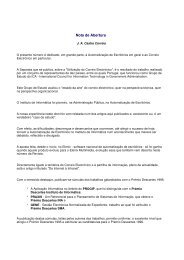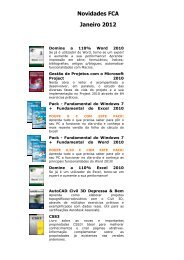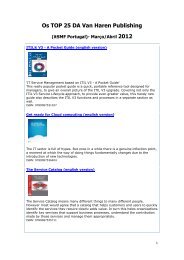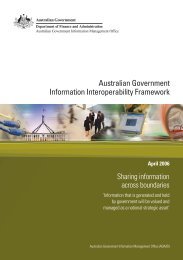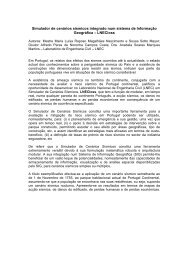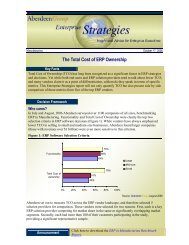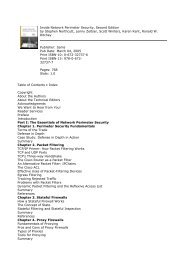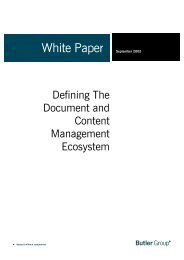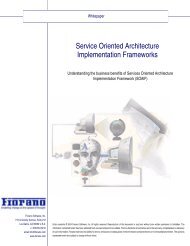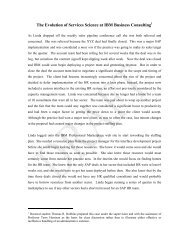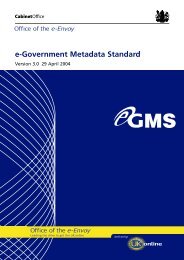OECD Peer Review of E-Government in Denmark - ePractice.eu
OECD Peer Review of E-Government in Denmark - ePractice.eu
OECD Peer Review of E-Government in Denmark - ePractice.eu
Create successful ePaper yourself
Turn your PDF publications into a flip-book with our unique Google optimized e-Paper software.
<strong>OECD</strong> PEER REVIEW OF E-GOVERNMENT IN DENMARK<br />
SUMMARY ASSESSMENT AND PROPOSALS FOR ACTION<br />
SEPTEMBER 2005<br />
Background<br />
At the request <strong>of</strong> the Danish <strong>Government</strong>, the <strong>OECD</strong> has conducted a peer review <strong>of</strong><br />
e-government <strong>in</strong> the Danish public sector. The overarch<strong>in</strong>g objectives <strong>of</strong> the review have been to:<br />
• Evaluate <strong>Denmark</strong>’s e-government strategies and solutions, with a focus on how they<br />
contribute now, and could contribute <strong>in</strong> the future, to its good governance objectives <strong>in</strong> the<br />
<strong>in</strong>formation age.<br />
• Further develop the <strong>OECD</strong>’s e-government analysis framework, and obta<strong>in</strong> knowledge and<br />
<strong>in</strong>formation that will enable robust cross-country comparisons <strong>of</strong> e-government <strong>in</strong> <strong>OECD</strong><br />
countries participat<strong>in</strong>g <strong>in</strong> the peer review processes.<br />
The analytical framework for the review is based on the <strong>OECD</strong> publications The e-<strong>Government</strong><br />
Imperative (2003) and E-<strong>Government</strong> for Better <strong>Government</strong> (2005). E-<strong>Government</strong> is exam<strong>in</strong>ed <strong>in</strong><br />
the context <strong>of</strong> public governance, reform and modernisation. The analytical process has <strong>in</strong>volved<br />
extensive review <strong>of</strong> published <strong>in</strong>formation about e-government and related government policies <strong>in</strong><br />
<strong>Denmark</strong>, a survey <strong>of</strong> State and local government organisations to which 116 organisations responded,<br />
and two sets <strong>of</strong> <strong>in</strong>-depth <strong>in</strong>terviews that <strong>in</strong>volved nearly 80 people from a wide range <strong>of</strong> organisations,<br />
both with<strong>in</strong> and outside <strong>of</strong> government.<br />
Introduction<br />
<strong>Denmark</strong> has been us<strong>in</strong>g ICT <strong>in</strong> government for several decades. Follow<strong>in</strong>g a pattern common <strong>in</strong><br />
<strong>OECD</strong> countries, dur<strong>in</strong>g the 1970s and 1980s the focus was ma<strong>in</strong>ly us<strong>in</strong>g process automation to<br />
achieve efficiencies <strong>in</strong> public adm<strong>in</strong>istration. Then, dur<strong>in</strong>g the 1990s, there was a shift towards<br />
exploit<strong>in</strong>g the potential <strong>of</strong> ICT to develop what, by the later part <strong>of</strong> the decade, was referred to as<br />
e-government. This new approach demonstrated a broadened understand<strong>in</strong>g <strong>of</strong> the potential impact <strong>of</strong><br />
ICT on improvement <strong>of</strong> government. Today, the Danish <strong>Government</strong> is pursu<strong>in</strong>g a vigorous<br />
e-government programme spann<strong>in</strong>g the whole <strong>of</strong> the public sector.<br />
<strong>Denmark</strong> has made considerable progress with e-government. In the 2003 European Commission<br />
eEurope benchmark<strong>in</strong>g exercise it ranked first <strong>in</strong> terms <strong>of</strong> full availability <strong>of</strong> public services onl<strong>in</strong>e,<br />
and second <strong>in</strong> terms <strong>of</strong> the sophistication <strong>of</strong> those services. In 2004, accord<strong>in</strong>g to EU measures,<br />
<strong>Denmark</strong>’s onl<strong>in</strong>e public services for both citizens and bus<strong>in</strong>esses were, collectively, the most<br />
“sophisticated” (i.e. allowed the most <strong>in</strong>teractivity) <strong>in</strong> Europe. Many other <strong>in</strong>ternational assessments <strong>of</strong><br />
countries’ e-government achievements have consistently ranked <strong>Denmark</strong> as one <strong>of</strong> the lead<strong>in</strong>g<br />
e-government nations.<br />
Despite this, Danish e-government faces a range <strong>of</strong> challenges <strong>in</strong>clud<strong>in</strong>g: 1) ma<strong>in</strong>ta<strong>in</strong><strong>in</strong>g<br />
momentum dur<strong>in</strong>g a time <strong>of</strong> major restructur<strong>in</strong>g <strong>of</strong> responsibilities across levels <strong>of</strong> government; 2)<br />
6



